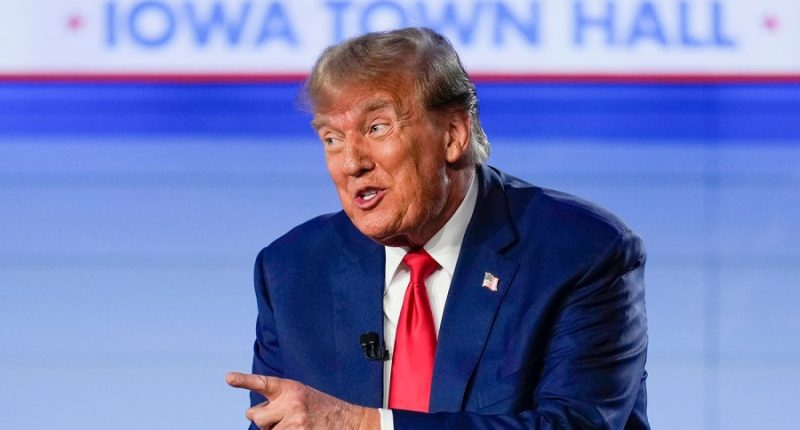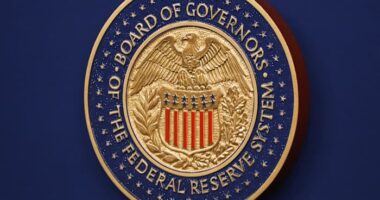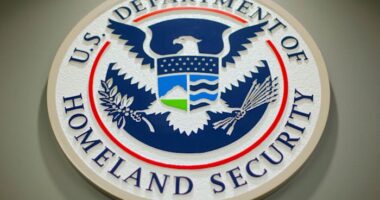Share this @internewscast.com

President Trump announced Monday his administration would impose a 25 percent tariff on imports from South Korea and Japan beginning Aug. 1 as part of a batch of letters going out to foreign countries.
Trump detailed the expected tariff rates in letters to the leaders of Japan and South Korea, also posting them to Truth Social. The president had previously indicated he would send letters to roughly a dozen countries Monday.
“Please understand this 25% number is far less than what is needed to eliminate the Trade Deficit disparity we have with your Country,” Trump wrote to both countries.
The president warned that if either nation raised its tariffs in response, the U.S. would increase its tariffs by the same amount.
“As you are aware, there will be no Tariff if Korea, or companies within your Country, decide to build or manufacture product within the United States and, in fact, we will do everything possible to get approvals quickly, professionally, and routinely – in other words, in a matter of weeks,” Trump wrote to South Korea’s president.
He conveyed the same message to Japan’s prime minister.
Under the “Liberation Day” tariffs announced on April 2, South Korea was hit with a 25-percent tariff and Japan hit with a 24-percent tariff, so Monday’s announcement amounts to an extension of the negotiation deadline, which was initially set for Wednesday.
The president also sent similar letters to the governments of Malaysia, Kazakhstan and South Africa, imposing 30 percent tariffs on their goods, and another to Myanmar laying out a 40 percent tariff.
White House press secretary Karoline Leavitt said Monday the president would send letters to a total of 12 nations by the end of the day, with more to come throughout the week. Trump is also scheduled to sign an executive order to delay his Liberation Day tariffs to Aug. 1.
Administration officials have been touting tariffs and the new protectionist U.S. trade posture as delivering results in the negotiating room, but the extended deadline and increased rate of punitive tariffs indicates that things may not be proceeding as smoothly as hoped.
“The administration’s delay announcement should come as no surprise,” Scott Lincicome, vice president of general economics at the Cato Institute, wrote in a commentary on Monday. “We’ve known since April that quickly inking, no less implementing, complicated trade agreements with dozens of foreign governments was impossible.”
Bill Reinsch, head of the international business program at the Center for Strategic and International Studies, told The Hill last week that he didn’t believe negotiations were going particularly well.
He said that Japanese and Korean negotiators have demanded exemptions from the tariffs on steel, aluminum and automobiles. He said the Koreans demanded exemptions from all the tariffs and that they hadn’t conceded on those points.
Only two trade deals have been announced so far, one with the United Kingdom that was met with mixed results from U.S. industry and one with Vietnam, about which details are scarce.
Securities markets came roaring back and hit new highs after tanking on the news of the April 2 tariffs, which were larger than many analysts had been anticipating and took even the Federal Reserve by surprise.
Stocks were down again on Monday. The Dow Jones Industrial Average of big U.S. companies was down more than 1.2 percent in early afternoon trading, and the S&P 500 was down nearly a percent.
Policy analysts told The Hill that they wondered if the rebound in equities wasn’t premature and whether markets had accurately priced stocks amid continuing uncertainties.
“We had warned clients a lot going into the second Trump administration that they had assumed away too much of the risk,” Beacon Policy Advisers managing partner Stephen Myrow told The Hill Monday. “Uncertainty is not a bug of the Trump administration trade policy – it’s a feature.”
Lincicome noted Trump’s sensitivity to market reactions regarding ongoing trade talks.
“The President is deeply concerned about the market reaction to a worst-case US tariff scenario,” he commented.
Updated at 3:20 p.m. EDT












